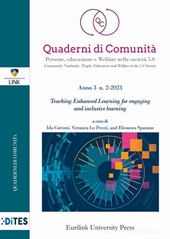Digital pharmacology
P. 37-43
The impact of digitalisation has completely revolutionized thesocio-economic system of the world. The proliferation of new languages and the unlimited acquisition of data has brought the global dissemination of multidisciplinary practices and knowledge. However, this process carries itself the risk of thought automation. Therefore, to avoid the danger, it is necessary to understand the digitalisation process of life from a pharmacological perspective to identify quality-based practices, tools and activities that act as an antidote to the toxicity inherent in digital processes.
In this regard, universities represent an indispensable resource to support the social change that started with the digital revolution because they are culturally engaged in research, identification, and development of innovative teaching tools oriented towards the quality of the digital experience. The university represents a unifying pole in which it is possible to form multidisciplinary communities that share the same ethical and social vision of digitalisation. The D-ChallengHE project, promoted by the DiTES Research Centre, meets this specific goal. Therefore, the purpose of this short contribution is to analyze how research projects like this can be a fundamental resource for sharing and promoting good practices for a critical understanding of digitalisation. [Publisher's text]
-
Artículos del mismo número (disponibles individualmente)
-
Información
Código DOI: 10.1400/295197
ISSN: 2785-3357


